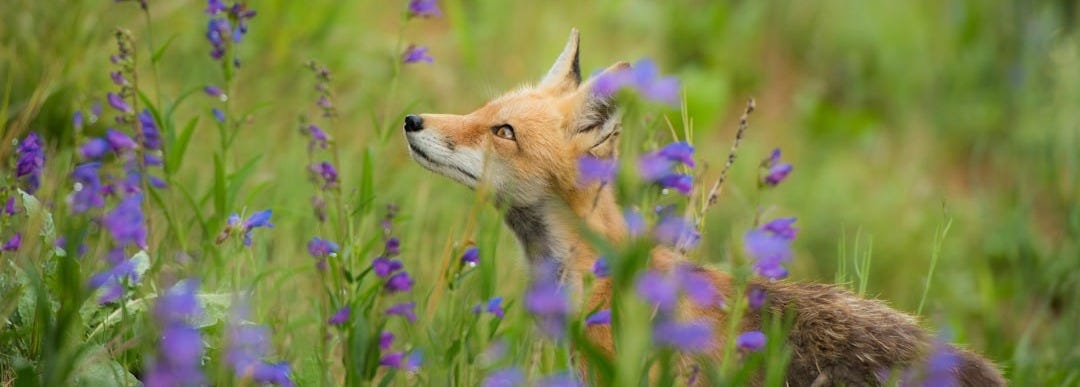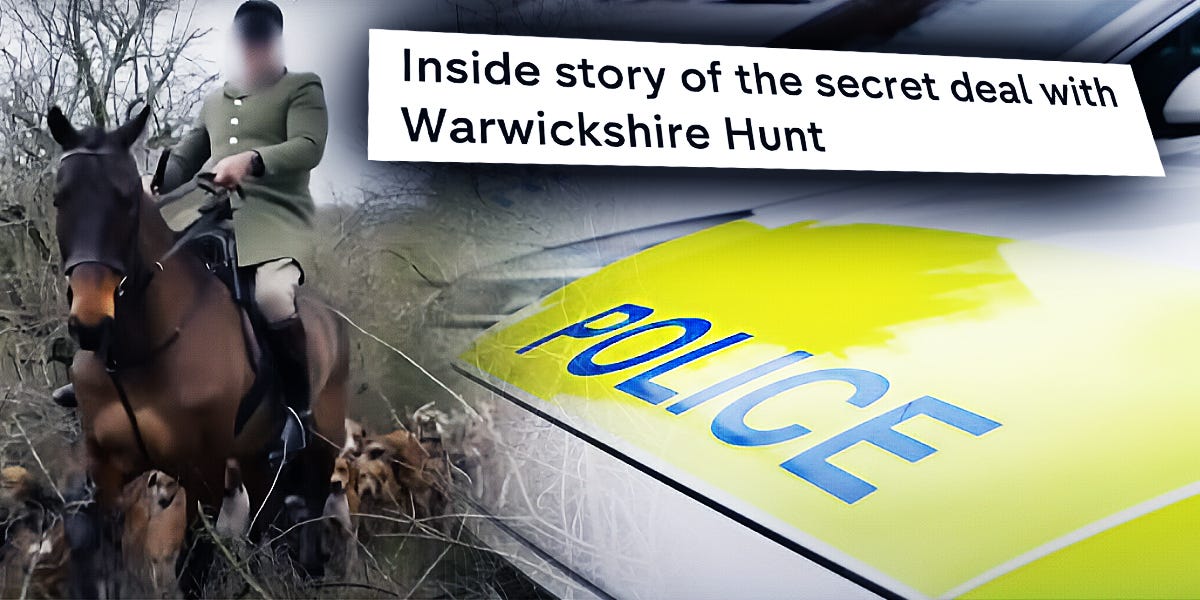REVEALED: Police force releases long-hidden agreement with Warwickshire Hunt
Warwickshire Police has released the controversial protocol it entered into with the Warwickshire Hunt. So, what have we found out?
Following months of pressure, Warwickshire Police has released the controversial protocol it entered into with the Warwickshire Hunt. So, what have we found out? Protect the Wild breaks it down.
Warwickshire Hunt was given a Community Protection Notice (CPN) in 2022 over anti-social behaviour during hunting, namely "unreasonable and dangerous use of the roads”. CPNs are issued to stop anti-social behaviour that "spoils the community’s quality of life." Failing to comply with a CPN is a criminal offence and can ultimately result in a fine.
The hunt appealed the CPN and reached a settlement agreement with Warwickshire Police that replaced it. This agreement – or protocol – remained hidden until recently, despite intense media scrutiny from the likes of Channel 4. Officers from Warwickshire Police spoke anonymously to the broadcaster, suggesting that the force was 'picking and choosing' what laws it upheld in making the deal. As Channel 4 reported, the force vehemently denied such accusations.
Due to the controversy, Warwickshire's police and crime commissioner (PCC), Philip Seccombe, commissioned an "independent review" into the force's handling of the situation. In itself, this was considered problematic by many, not least because the agreement was struck on Seccombe's watch. The PCC is also a member of the pro-hunt Countryside Alliance. As a result, West Midlands Hunt Saboteurs has argued that a "full and impartial public inquiry" is needed. Warwick and Leamington MP Matt Western has called for similar too.
The review was published on 8 January. Coming as little surprise to critics, it largely concluded that the police force acted appropriately. While the review found shortcomings, particularly around communication and oversight, its author, David Peet, said:
"there is no evidence to suggest undue influence from the Police and Crime Commissioner in operational matters, and I am satisfied that operational independence was maintained throughout."
Warwickshire Police published the protocol, which is now obsolete, shortly after the review was released. So, what's in it?

Opening lines of communication
At its core, the protocol aimed to "better protect" road users, the public, and the hunt, by 'improving lines of communication' between the police force and the hunt, according to the document. To be clear, this protocol was necessary because of the hunt's dangerous behaviour on roads. So, it is the hunt that the public (and apparently the hunt itself) needed better protection from.
The protocol also highlighted that it relates to trail hunting, which it described as a simulation of traditional hunting. However, it failed to acknowledge that Warwickshire Hunt is one of the most notorious hunts when it comes to allegations of illegal activity.
In our analysis of reports published by hunt saboteur and monitor groups, newspapers, and members of the public, across the 2023/24 hunting season, Protect the Wild found that Warwickshire Hunt was among the top five hunts with the most instances of fox hunting attributed to them. The year earlier, Warwickshire Hunt took the top spot, accounting for 12% of the fox hunting incidents across the 2022/23 season. Protect the Wild publishes these analyses in yearly reports on hunting practices in England and Wales.
The protocol bears some similarities to the CPN, such as by placing conditions on the hunt to give police notice of its activities. But there are some clear differences too.
First, to "improve the quality and frequency of the communications" between the hunt and police, several lines of communication were put in place under the protocol. The hunt provided the police with notice of its hunting meetings, contact details for two "points of contact" for each hunting day, and it met remotely with the police once a month to discuss issues.
Additionally, the hunt had to provide a "central 'complaints' email address" under the agreement, which as 'far as the law permitted', the police used to relay "any credible complaints" against the hunt made by the public. In response, the hunt had to explain any steps it had taken in relation to the complaints on a monthly basis.
As the Hunt Saboteurs Association (HSA) highlighted, this means that the protocol gave Warwickshire Hunt significant access to the police force – and access to some of the complaints against it, namely ones that the force was legally permitted to relay. HSA pointedly asked:
"Who else gets this access? And what other bodies facing legal action from the police receive this special treatment?"
Changed consequences
Second, the protocol changed the consequences for the hunt in the event of a breach.
As already mentioned, a breach of a CPN is a criminal offence and can lead to a court summons, conviction, and a resulting fine. In contrast, a breach of the protocol would trigger the police first bringing the violation to the attention of an unnamed individual or entity.
This party is unknown because the police force chose to redact that part of the document. However, the HSA have assumed the party in question is the hunt itself, which makes sense when you consider what comes next.
After Warwickshire Police alerted the unnamed individual or entity to a breach, they were given 14 days to respond. If their response was unsatisfactory, the police then had the option of reporting the violation to the British Hound Sport Association (BHSA), which is the regulatory body for hunts. If the BHSA considered the breach to be "proven," it could pass the matter onto its own complaints and disciplinary arm, the Hound Sports Regulatory Authority. The HSRA has the power to fine the hunt and take its licence temporarily or indefinitely. But whether any action was taken in the event of a breach would be up to the industry body.
To sum up, if the CPN had remained in place, a breach of it would have had legal implications for the hunt, whereas the protocol outlined a process for handling breaches that contained no mention of criminal liability.
The protocol did stress that the police were able to issue a warning letter (a prerequisite of a CPN) or CPN in response to a breach of it, when the violation in question "satisfies the requirements for doing so." But this would essentially put the police back to square one, as it issued a warning letter to the hunt in May 2022, before serving the CPN to the hunt in December that year.
To cut a long story short, it's hard not to view this protocol as favourable to the hunt, particularly considering how it changed the consequences the hunt faced for breaches.
The protocol said one of its key objectives was to "increase public confidence in the activities of the Hunt and Warwickshire Police." Given what was in the long-hidden agreement, Protect the Wild suspects public confidence has not increased as a result of this protocol, quite the opposite in fact!
We rely on the generosity of the public to continue our vital work. We don’t have any major backers or government funding so every donation and shop purchase is vital to ensure we can continue to stand up for British wildlife.






I am so angry. I have been burning with rage since reading this, and had to go away and think about why I was reacting so strongly to this information. It confirms what most of us here have always suspected and probably known, that some members of the police are complicit in enabling illegal fox hunting. The hunts already have unlimited finances and resources at their disposal, to appeal, fight back and bully their way to have the right to go marauding through the countryside, murdering wildlife, intimidating and assaulting anyone who dares to have a different opinion to themselves or who disagree with what they are doing. It seems to prove they have the police in their pockets too, to protect them from their crimes. No wonder they arrogantly believe they are above the law and should face no consequences like the rest of us muggles, if they have implicit police protection. This explains everything, why they have been allowed to get away with it for so long. This is unjust, it is corrupt and it is wrong.
I think without Protect The Wild, the sabs on the frontline who will not be cowed and all the other people here who care as passionately as I do, I would feel utter despair and hopelessness. This community is growing, people are waking up and calling for change, and that is hugely down to Protect the Wild and the sabs gathering valuable information and proof that illegal fox hunting is still very much continuing, and the hunts are all conniving liars.
Thank you for exposing this corruption. I hope this gets onto more social media feeds. Thank you for never giving up fighting for foxes and wildlife. ✌️
WHEN YOU HAVE A CONFLICT OF INTEREST, IT SHOWS THAT THERE IS A COVER UP WHEN THE DECISION GOES THE WAY OF SIDE THAT HAS SUPPORT FOM THE AUTHORITIES. WE MUST HAVE UNBIASED PEOPLE LOOKING INTO THESE MATTERS SO THAT WE CAN BELIEVE A CORRECT DECISION WAS MADE.